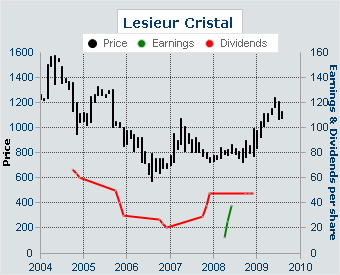 Lesieur Cristal
Lesieur Cristal
All data are collected in the Fiscal Year of 2008-2009.
Company Profile and History
The first Moroccan Agro-Industrial company, Lesieur Cristal works in two sectors; the triturating of oleaginous seeds, and refining of oils. During 2005, the company diversified its activities in the field of bleaches and products of hygiene and domestic maintenance and is prominent in the field of animal feeds.
Lesieur Cristal was created from the merger of three companies established in Morocco since the 1940s: Lesieur Africa Unigral, Crystal Society and Exploitation of Oil Products.
The Lesieur Company was created in 1908 in northern France by Georges Lesieur, former President of the Chamber of Commerce of Paris and a subsidiary was established in Morocco in 1942. In 1950 SWOT (Société d'Exploitation of Oil Products) for crushing of oil seeds was established and in 1954 an industrial union for oil mills. In 1973 the Industrial Union changed its name to Crystal Unigral. It was nationalized in 1974 and integrated into ONA (Omnium Nord Africain) in 1978. In 1980 Lesieur Africa was taken over by the National Fortification Alliance (NFA) and merged with Crystal Unigral to give birth to Unigral Lesieur Cristal (LAUCA). The name was changed to Lesieur Cristal in 1993.
In Country Location
1 rue Caporal Corbi Roches Noires, 20300 Casablanca, Morocco;
Telephone: +212 22 67 93 50
Telefax: +212 22 35 45 78
Services and Products
The Group's principal activities are the triturating of oleaginous seeds and the production and refining of crude oils, manufacture of detergents and cattle cakes. It is also involved in the manufacturing of packaging materials. The oil is manufactured by the use of sunflower seeds, peanuts, olives, coleseed, maize, soybeans and cotton seeds. The Group's products include cooking oils, brand-name soaps and cattle cake (used in animal feed).
Number of Employees
1,314 people
Financial Information
In 2008, the turnover was 4,308 MDH. 2007 Sales was 3,858,400,000 Dirhams
(Year Ending Jan 2008).

Market Share
Lesieur Cristal Market share: Edible Oil: 4%, Olive oil: 16%, Oil cakes: 45%, Soap: 87%, Cleaning products: 28%
Business Objective
To ensure sustainable development of its activities in an increasingly competitive environment
Business Model
Lesieur Cristal focuses on four strategic areas: securing and optimizing purchases; defend its market share through the development of its leading brands; rationalization of its distribution channels; and improving its operational costs.
Given the global recession, it focuses on the development of its core business: olive oil, to secure and stabilize its olive oil upstream activity. Simultaneously it continues to pursue a policy of purchasing proactively to cushion the effects of volatility and consumer
price shocks.
Lesieur Cristal also sees quality improvements as a strategic lever for sustainable development of its activities. Innovation and research and development are also key to constantly provide consumers with a diverse range of products of high quality.
Ownership of Business
56.1% owned by ONA Group
Benefits Offered and Relations with Government
Agriculture is the most heavily protected sector with a simple average tariff of 29.0 percent, and rates that vary from 2.5 percent (for most agricultural equipment) to 304 per cent (on live sheep and goats and their meat). Tariff quotas are applied to agricultural products such as meat (bovine, sheep and poultry meat), milk, cereals (common wheat, barley, maize, rice and sorghum), soya and colza seed, oils, sugar and oilseed cake.
Numerous subsidies are granted to the agricultural sector for, among other things, improvements, the purchase of agricultural equipment, and providing value added for agricultural products. Since 2003, there has also been a subsidy for the production of sunflower seed for crushing (at most 4 per cent of edible oil production). The total amount of this subsidy gradually decreased from DH 108.2 million in 2003 to DH 15.6 million in 2007; in 2008, no subsidy was granted because of the rise in prices. At present, oilseed is being crushed by two companies- Lesieur Cristal and Huileries du Souss.
Agricultural incomes are exempt from all taxation until 2013. Where financing is concerned, the Crédit Agricole du Maroc (CAM) grants seasonal loans and medium- and long-term loans, for farm equipment and modernization, at rates of 5 percent for short-term loans and 5.5 percent for medium- and long-term loans. In 2007, it was decided to set up a Société de financement pour le développement agricole - SFDA (Agricultural Development Finance Company), a subsidiary of the CAM, which is in course of being established. In 2007, CAM's contribution to the financing of agricultural sector and agro-industry activities amounted to DH 21.8 billion.
Product Development
In order to refocus on its core business, Lesieur Cristal chose to outsource its cleaning business in 2008 to Distra in which it took a 32% stake. The company also opened a new refinery in Ain Harrouda with a capacity of 600 T/day; and upgraded its tank farm by launching a new fleet of stainless steel storage facilities of 2,000 tonnes of refined oils.




